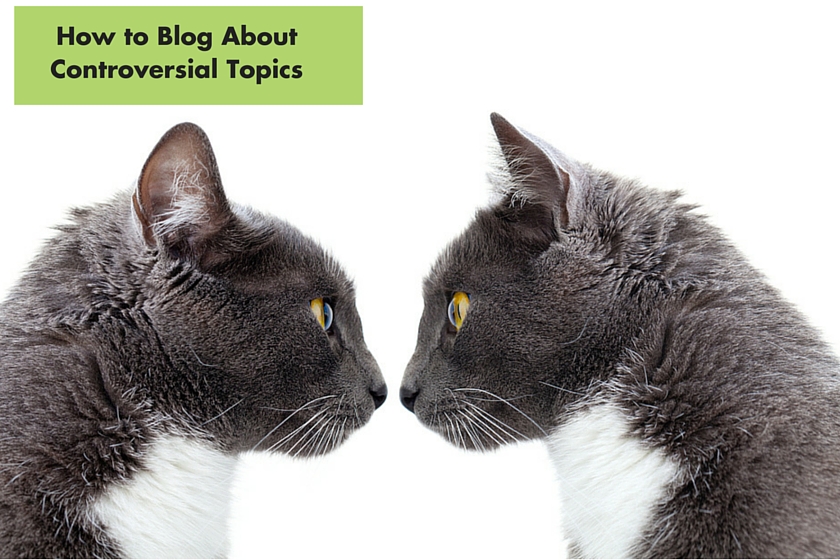How to Blog About Controversial Topics
Controversial blog topics are definitely reader and traffic inducing, but as with all blog topics, there is a way to approach them, handle the content, and respond to feedback.
As a blogger, where is the fine line and when does one cross it? Do you sit on your hands and resist temptation when an opposing view crosses your social media feed? What’s the right way and not-so-swift way to handle a handle or controversial topic? Some folks think that the word ‘controversy’ is a bad thing, when in essence, it is not. Merriam Webster defines ‘controversy’ as: “a discussion marked especially by the expression of opposing views.” It’s a debate, folks.
Let’s break it down, hot piece by hot piece.
Decide if the Blog Post is Opinion or Fact-Based
From a journalist standpoint, one of the steadfast rules I follow is to have solid resources in place to support a strongly-worded piece. If I am tackling a controversial topic, I want to be sure I have my ducks in a row and sources in place. If the piece is an opinion, be sure to state this in your post. Where can you find resources? Keep reading.
Here’s an example:
Fact: According to a piece filed by Yahoo, The New Jersey Senate recently approved a bill that would require pet stores licensed after January 12, 2016, to sell only dogs and cats obtained from shelters and animal rescue organizations.
This is a hot topic in the animal world because some within the pet industry believe this diminishes existing pet protection laws currently on the books and that pet stores will be very limited in what choices they can offer, if at all, in pets.
If you want to write about a controversial topic and have no clue where to start, consider that not all controversy has to be negative. Sometimes, controversy is merely taking a stance on a hot topic. Maybe you are simply a fact presenter, and that is fine. A fact-based blog post that is well-researched, offers opposing views, and is presented to let the reader decide without swaying one way or the other is solid journalism. Be certain to get quotes, names, and titles correct.
Get Ready for Backlash
If you do take a stance one way or another, be ready for a potential backlash. In the event someone bashes me, calls me names, becomes defamatory or otherwise puts me down, their comments are not allowed on my blog. No one needs to put up with abuse. While civil debate is encouraged, being plain mean and offensive should never be tolerated. Watch what you put in writing, so resist the urge to blast someone with your words. Social media has a permanent e-thumbprint. People share posts.
HACTIC (hack and tactic): To prepare for a backlash, as you are writing your post, anticipate negative replies and keep a document or column in a handy organizer like Trello with your potential responses. It will come in handy when you feel tense, defensive, or when someone catches you off guard. Always take the high road. Bloggers are watched by peers, readers, brands, and more. Your words and position will follow you.
Have Blogger Ammunition Ready
Be a fact provider and use visuals if able. Do you have a link to a supporting study? A chart? A graph? Your own fact-based infographic? These are all tools of the trade when you want to support a controversial topic. They are not all needed but they sure help carry words. Facts help prove a point. Visuals get shared. Video is all that and a milkshake and just getting more popular on social media in general.
Separate Fact from Fiction
Will you alienate anyone as a result of your words? Prepare for this and have a “how far do I really want to go” element in place. I tend to follow my gut but fact check with my head. That’s my job as a journalist and a blogger: To separate fact from fiction, follow my gut, but be able to substantiate my opinion with why I feel that way while providing sources for fact-based posts.
Tweak a Controversial Topic Ever So Slightly
If you want to write about a controversial topic and have no clue where to start, consider that not all controversy has to be negative. Sometimes, controversy is merely taking a stance on a hot topic. Case in point: “How to Spot a Bad Pet Groomer” makes a good headline; just be sure to deliver.
Now your turn: Have you ever blogged about something controversial? Care to share the URL in the comments? We welcome and encourage feedback below.
Like this post? Here are more to check out:
How to Find Blog Resources for Posts
The Ultimate List of Pet Blogging Resources
About the Author: Carol Bryant is the Marketing and Social Media Manager for BlogPaws and runs her own blog, Fidose of Reality and its fundraising arm, Wigglebutt Warriors. When not busy playing with her Cocker Spaniel, Dexter, she stays far away from cooking. Her trademark is her mantra and is tattooed on her arm: My Heart Beats Dog.®
Images: motorolka/Shutterstock.com and Leksele/Shutterstock.com





